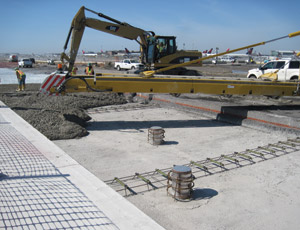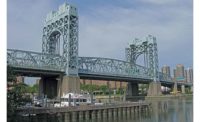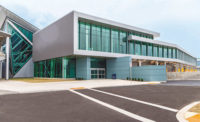PROJECT COST: $376.3 Million
There are few things in life more frustrating being stuck in a plane, on the tarmac and being told your flight is delayed.

JFK Airport, one of the busiest in the country, is taking a major step to alleviate this nuisance by reconstructing and expanding its busiest runway. The Bay Runway, otherwise known as Runway 13-31, which handles around half of all JFK traffic, will be widened from 150 to 200 feet along its 14,572-ft length. And while the project may appear as a basic repaving job at first, the $370 million undertaking is the largest construction project at the airport since at least 1988, according to James Steven, manager at the JFK Physical Plant and Redevelopment arm.
In addition to the widening, as well as new drainage and electrical infrastructure, perhaps the most significant improvement is going from asphalt to concrete: Asphalt, the material of choice at JFK airport, has a lifespan of five to 10 years. Concrete's is nearly 40, but installing concrete costs about 10 percent more over asphalt and takes out the runway under reconstruction out of commission for a significantly longer time. Furthermore, asphalt is typically overlayed in sections, which means part of the runway can be used for flights during construction, while working with concrete requires taking out the entire runway for the length of the construction cycle, drastically impacting overall airport operations, potentially causing those dreaded minutes and hours on the tarmac.
"We did a lot of planning and soul searching and realized if we it in concrete we would extend the life cycle," Steven said. "We came up with a plan: We'll take a lot of hurt right now in this 120 days, but we'll have a runway for 40 years with very little maintenance on it."
The result of reducing maintenance frequency is expected to net the airport a savings of $300 million to $400 million over the concrete runway's life span-far outweighing the initial premium of concrete. By the end of June, 10,900 ft of the runway will be online; by November, the entire length will be in use for flights while additional work is being performed, scheduled for completion next June. To meet the 120-day schedule, crews have been working 24/7 since March.
As for those times on tarmac: JFK brought in consultants to work with the airlines and the FAA-the level of coordination, pre-approval, and cost and risk assesment on this project was unprecedented, according to Steven, and involved several firms working on the project in addition to the actual construction-to minimize delays, coming up with a system that does away with the "You're number 37 on the runway" concept and instead working more closely between the control tower and the pilots to let people wait inside the airport instead.
"Then when you get called to the plane, we're turning those planes in 10 to 15 minutes," Steve said. "The perception on the passenger's part is that things are moving much more smoothly."
Key Players
Owner: Port Authority of New York and New Jersey
Project Management: JFK Physical Plant & Redevelopment
Construction Management Oversight: JFK Construction Management Division
General Contractor: Tutor Perini, Sylmar, CA
Electric: Bel Air Electric Construction, Jamaica, NY
Paving: InterCounty Paving, Hackettstown, NJ



Post a comment to this article
Report Abusive Comment